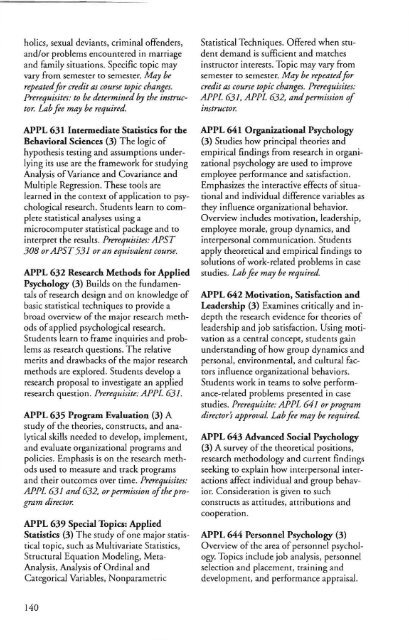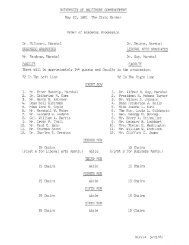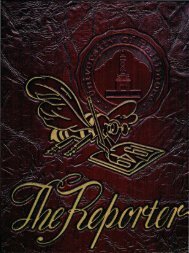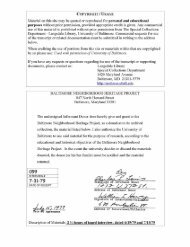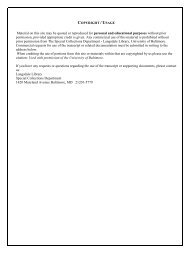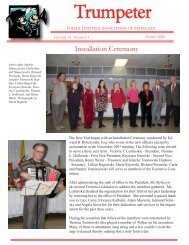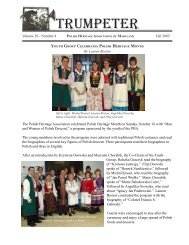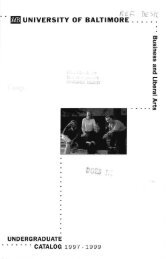2003-2005 - Special Collections - University of Baltimore
2003-2005 - Special Collections - University of Baltimore
2003-2005 - Special Collections - University of Baltimore
Create successful ePaper yourself
Turn your PDF publications into a flip-book with our unique Google optimized e-Paper software.
holics, sexual deviants, criminal <strong>of</strong>fenders,<br />
and/or problems encountered in marriage<br />
and family situations. Specific topic may<br />
vary from semester to semester. May be<br />
repeatedfor credit as course topic changes.<br />
Prerequisites: to be determined by the instructor.<br />
Lab fee may be required.<br />
APPL 631 Intermediate Statistics for the<br />
Behavioral Sciences (3) The logic <strong>of</strong><br />
hypothesis testing and assumptions underlying<br />
its use are the framework for studying<br />
Analysis <strong>of</strong>Variance and Covariance and<br />
Multiple Regression. These tools are<br />
learned in the context <strong>of</strong> application to psychological<br />
research. Students learn to complete<br />
statistical analyses using a<br />
microcomputer statistical package and to<br />
interpret the results. Prerequisites: APST<br />
308 or APST531 or an equivalent course.<br />
APPL 632 Research Methods for Applied<br />
Psychology (3) Builds on the fundamentals<br />
<strong>of</strong> research design and on knowledge <strong>of</strong><br />
basic statistical techniques to ptovide a<br />
broad overview <strong>of</strong> the major research methods<br />
<strong>of</strong>applied psychological research.<br />
Students learn to frame inquiries and problems<br />
as research questions. The relative<br />
merits and drawbacks <strong>of</strong> the major research<br />
methods are explored. Students develop a<br />
research proposal to investigate an applied<br />
research question. Prerequisite: APPL 631.<br />
APPL 635 Program Evaluation (3) A<br />
study <strong>of</strong> the theories, constructs, and analytical<br />
skills needed to develop, implement,<br />
and evaluate organizational programs and<br />
policies. Emphasis is on the research methods<br />
used to measure and track programs<br />
and their outcomes over time. Prerequisites:<br />
APPL 631 and 632, or permission <strong>of</strong>the program<br />
director.<br />
APPL 639 <strong>Special</strong> Topics: Applied<br />
Statistics (3) The study <strong>of</strong>one major statisrical<br />
topic, such as Multivariate Sratistics,<br />
Structural Equarion Modeling, Meta<br />
Analysis, Analysis <strong>of</strong> Ordinal and<br />
Categorical Variables, Nonparametric<br />
140<br />
Statistical Techniques. Offered when student<br />
demand is sufficient and matches<br />
instructor interests. Topic may vary from<br />
semester to semester. May be repeated for<br />
credit as course topic changes. Prerequisites:<br />
APPL 631, APPL 632, andpermission <strong>of</strong><br />
instructor.<br />
APPL 641 Organizational Psychology<br />
(3) Studies how principal rheories and<br />
empirical findings from research in organizational<br />
psychology are used ro improve<br />
employee performance and satisfaction.<br />
Emphasizes the interactive effects <strong>of</strong> situational<br />
and individual djfference variables as<br />
they influence organizational behavior.<br />
Overview includes motivation, leadership,<br />
employee morale, group dynamics, and<br />
interpersonal communication. Srudents<br />
apply theorerical and empirical findings to<br />
solutions <strong>of</strong> work-related problems in case<br />
studies. Lab fee may be required.<br />
APPL 642 Motivation, Satisfaction and<br />
Leadership (3) Examines critically and indepth<br />
the research evidence for theories <strong>of</strong><br />
leadership and job satisfaction. Using motivarion<br />
as a central concept, students gain<br />
understanding <strong>of</strong>how group dynamics and<br />
personal, environmental, and cultural factors<br />
influence organizational behaviors.<br />
Students work in teams to solve performance-related<br />
problems presented in case<br />
studies. Prerequisite: APPL 641 or program<br />
director's approval. Lab fee may be required.<br />
APPL 643 Advanced Social Psychology<br />
(3) A survey <strong>of</strong> rhe theoretical positions,<br />
research methodology and current findings<br />
seeking to explain how interpersonal interacrions<br />
affect individual and group behavior.<br />
Consideration is given to such<br />
consrructs as attitudes, arrributions and<br />
cooperation.<br />
APPL 644 Personnel Psychology (3)<br />
Overview <strong>of</strong> the area <strong>of</strong> personnel psychology.<br />
Topics include job analysis, personnel<br />
selection and placement, rraining and<br />
development, and performance appraisal.


